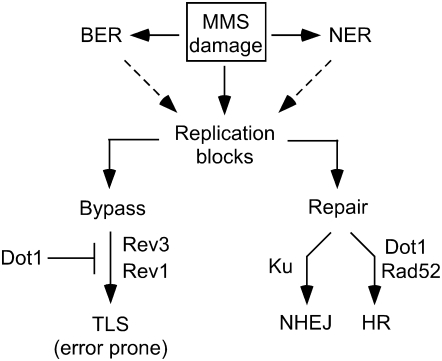Figure 10.—
Model for the role of Dot1 in the response to alkylating damage. MMS-induced damage can cause the stall of replication forks either directly or as a consequence of incomplete BER or NER. Stalled replication forks result in recombinogenic lesions, which can be repaired mainly by Rad52-dependent HR, with NHEJ acting as a minor repair pathway for DSBs. Replication blocks can also be bypassed by the action of TLS pathways. Dot1 functions as a negative regulator of Polζ- and Rev1-dependent TLS and is also required for efficient HR. In the absence of Dot1, the enhanced TLS activity results in fewer stalled replication forks, leading to increased MMS resistance.

